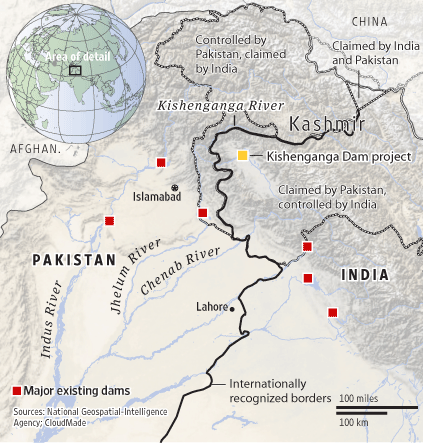Recently, the distribution of water between two Indian states Tamil Nadu and Karnataka has become a source of conflict over water divide, sweltering both into flames. This issue is India’s internal matter regarding water distribution from the river Cauvery. Riots also erupted when Supreme Court of India ordered to divert some water from Cauvery to Tamil Nadu. The unrest impelled Indian Prime Minister Modi to appeal for dissolution of the issue peacefully and sharing water equally at domestic level.
However, regionally, while talking about Pakistan, PM Modi has reiterated that the water belonging to India cannot flow to Pakistan. As tensions between both South Asian states are on the verge. Such statement by Modi invokes an important question:
Could the subcontinent’s nuclear powers (India and Pakistan) lead towards a water war? Given the recent Line of Control (LoC) violations and Kashmir dispute this Modi’s statement is fermenting two nations towards water war.
What does the Indus Water Treaty state?
Pakistan and India have been in conflict over the distribution of water since their independence from British colonial rule in 1947. But thanks to the effort of World Bank, which forced both nations to seal an agreement, Indus Water Treaty, on September 19, 1960, regarding the distribution of six rivers of the Indus basin. Under this agreement, three western rivers Indus, Jhelum and Chenab are allocated for unlimited usage by Pakistan while the eastern rivers that constitute Sutlej, Bias and Ravi are for India.
In consideration, under this treaty, India can use 20% of the water from the western rivers, while, leaving the remaining 80% of water to flow unhindered towards Pakistan. The Indus basin treaty has a significant role in the economy of Pakistan where 60% of this water is used for agricultural purposes. Moreover, there are several small and big dams in Pakistan which are part of this basin, are a primary source of producing electricity and drinking water.
The two parties, as a matter of fact, have fought three wars, where two were fought after signing the treaty and several other minor and major conflicts also occurred. However, the pact still survived. While keeping in mind the recent LoC violations, it somehow presents a different story where India is trying to up the ante using water as a trigger for war.
Why is the Treaty suddenly in dispute?
Interestingly, After the Uri attack in September, Mr. Modi chaired a high-level meeting with certain government officials amidst of scraping the Indus Water Treaty to ratchet up the tensions to take revenge of Uri attack but failed to back up its accusations of portraying Pakistan as the weaker state. This Indian isometric to offcut the Indus Water Treaty signed in 1960 would lead both countries to a dead end.
The Wullar Barrage twist
Another twist in this water treaty is the Wullar barrage, Tulbul navigation project by India over Jhelum River. The project is a “navigation lock-cum-control structure” at the mouth of the Wullar Lake. Pakistan has serious reservations over the project as it will choke the water flow towards Pakistan. There have been feverish speculations that utilizing such projects would maximize the use of water by India from western sources, which would ultimately cut down the flow of water to Pakistan.
Instead of the Tulbul Project main apprehensions from Pakistan side are:
(1) A barrage may damage Pakistan’s triple-canal project linking Jhelum and Chenab with the Upper Bari Doab Canal;
(2) A barrage would be a security risk enabling the Indian Army to make crossing the river either easy or difficult, at will, by the controlled release of water;
(3) After constructing the dam, India would control the flow of water into the Jhelum, creating drought and flood situations at will in Azad Kashmir and Pakistan; and
(4) It would ruin Pakistan’s agriculture.
Why Pakistan Worries?
Ominously, Pakistan is itself a water stressed country and such hostile moves by India may force Pakistan to respond and could complicate problems for India itself. As some studies suggests that by 2040, Pakistan would be world’s most water-starved country in the region. As Pakistan is deeply dependent on the water that flows from Western Rivers, such moves by India may also be taken as an act of war which will have disastrous consequences for India.
Prime Minister Narendra Modi has chosen to maintain a studied silence on resolving the existing disputes. Nevertheless, frivolous statements by India have forced the region to enter into a crucial phase, where there is a possibility of water-conflict-escalation towards total war. The consequence of the recent statement by Mr. Modi in using water threat for Pakistan invokes both nations to confront towards the arena of water wars.
To be sure, India must preserve the Indus Water Treaty in its true spirit as overturning it will have disastrous consequences not only for both states but also for the entire region.

